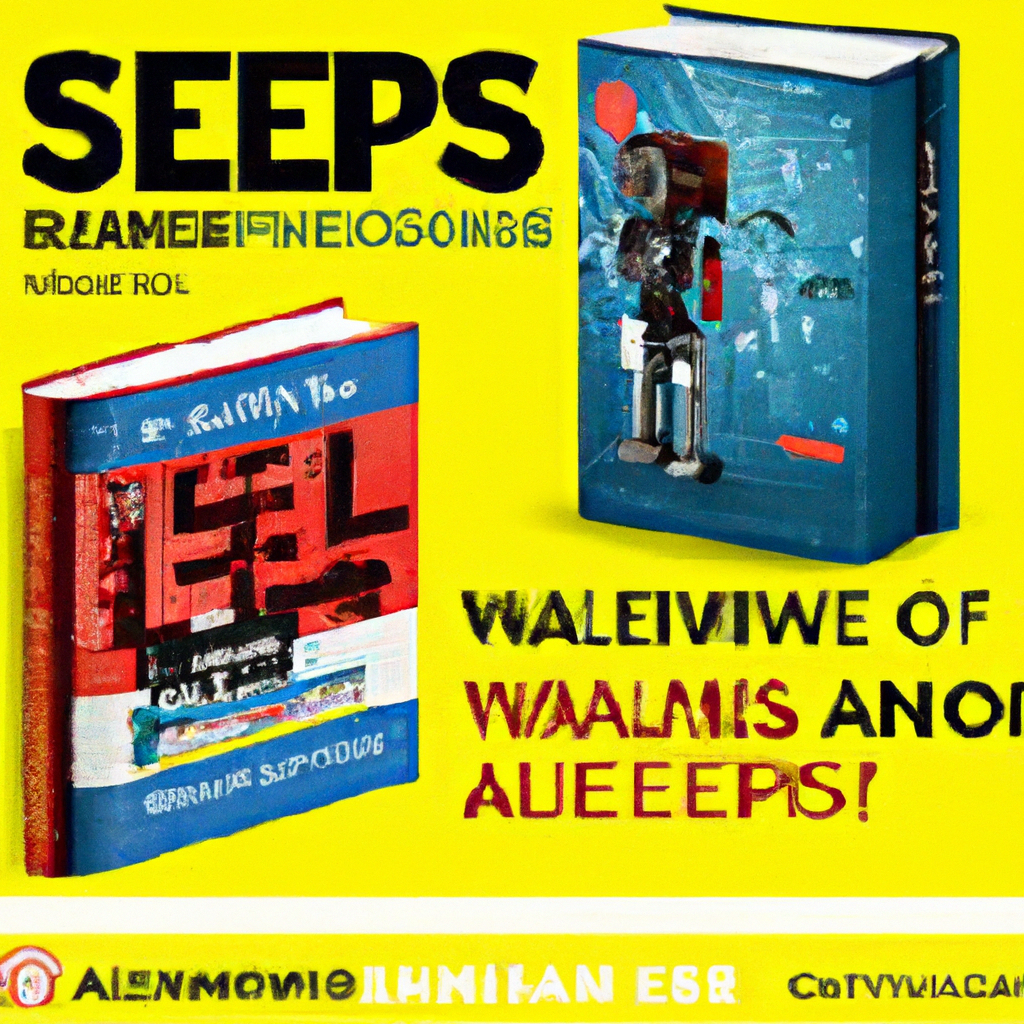Looking to expand your knowledge on Artificial Intelligence? Look no further! In this article, you will discover a curated list of the best AI books that are guaranteed to take you on an exciting journey into the world of intelligent machines. Whether you’re a curious beginner or an experienced professional, these books will provide you with invaluable insights, practical tips, and thought-provoking ideas that will enhance your understanding of AI. So, grab a cozy spot, make yourself comfortable, and get ready to embark on an exciting reading adventure!

History of AI
The Age of Intelligent Machines by Ray Kurzweil
“The Age of Intelligent Machines” by Ray Kurzweil is a must-read for anyone interested in the history of AI. Kurzweil takes us on a captivating journey through the evolution of artificial intelligence, from its inception to its current state. He explores the breakthroughs, challenges, and the future potential of AI. This book is a great resource for understanding the early pioneers in the field and their contributions that laid the foundation for what we have today.
Artificial Intelligence: A Modern Approach by Stuart Russell and Peter Norvig
“Artificial Intelligence: A Modern Approach” by Stuart Russell and Peter Norvig is a comprehensive textbook that covers a wide range of AI topics. It provides a balanced and thorough understanding of AI, including its history, foundations, problem-solving techniques, machine learning, and natural language processing. With its clear explanations and practical examples, this book is a valuable resource for students, researchers, and professionals looking to dive deeper into the field of AI.
Thinking, Fast and Slow by Daniel Kahneman
While not solely focused on AI, “Thinking, Fast and Slow” by Daniel Kahneman is a thought-provoking book that explores the cognitive biases and decision-making processes of the human mind. This knowledge is essential for understanding AI and its impact on society. As AI systems become more prevalent, it is crucial to examine the potential biases and ethical implications they may introduce. Kahneman’s book provides valuable insights into the complexities of human thought and how AI can be designed to account for them.
AI in Fiction
Neuromancer by William Gibson
“Neuromancer” by William Gibson is a groundbreaking science fiction novel that popularized the concept of cyberspace and virtual reality. Set in a dystopian future, the book explores themes of artificial intelligence, hacking, and the blurring lines between humans and machines. Gibson’s visionary storytelling and vivid imagination make this a must-read for AI enthusiasts and those interested in exploring the ethical dilemmas that arise when technology and humanity intertwine.
I, Robot by Isaac Asimov
“I, Robot” by Isaac Asimov is a collection of interconnected short stories that delve into the relationship between humans and intelligent robots. Asimov’s famous Three Laws of Robotics are introduced in this book, which explore the ethical boundaries and moral responsibilities of AI. With gripping narratives and thought-provoking scenarios, “I, Robot” prompts us to reflect on the implications of AI in our own world and serves as a cautionary tale of the potential consequences if mishandled.
Do Androids Dream of Electric Sheep? by Philip K. Dick
“Do Androids Dream of Electric Sheep?” by Philip K. Dick is the novel that inspired the iconic film “Blade Runner.” Set in a post-apocalyptic future, the book centers around the concept of androids, or human-like robots, and the ethical questions surrounding their existence. Dick’s thought-provoking exploration of empathy, identity, and the fine line between humans and machines makes this a must-read for anyone interested in the intersection of AI and humanity.
Machine Learning
Machine Learning: A Probabilistic Perspective by Kevin Murphy
“Machine Learning: A Probabilistic Perspective” by Kevin Murphy offers a comprehensive and in-depth overview of machine learning algorithms and techniques. The book covers the fundamental principles of machine learning, including probabilistic models, Bayesian networks, and deep learning. With a strong emphasis on the probabilistic foundations, this book is highly regarded as a go-to resource for both beginners and seasoned practitioners in the field.
Deep Learning by Ian Goodfellow, Yoshua Bengio, and Aaron Courville
“Deep Learning” by Ian Goodfellow, Yoshua Bengio, and Aaron Courville is a comprehensive guide to understanding and implementing deep learning techniques. Deep learning, a subset of machine learning, has revolutionized AI by enabling neural networks to learn and make complex decisions. The book covers the theoretical foundations of deep learning and provides practical examples and code implementations. Whether you are a student, researcher, or industry professional, this book is an invaluable resource for mastering deep learning concepts.
The Hundred-Page Machine Learning Book by Andriy Burkov
“The Hundred-Page Machine Learning Book” by Andriy Burkov is a concise yet comprehensive guide to machine learning. As the title suggests, this book condenses the vast field of machine learning into an easy-to-digest format. It covers essential topics such as supervised and unsupervised learning, neural networks, and model evaluation. With its clear explanations and practical examples, this book is highly recommended for beginners looking to jump-start their understanding of machine learning.
AI in Business
Prediction Machines: The Simple Economics of Artificial Intelligence by Ajay Agrawal, Joshua Gans, and Avi Goldfarb
“Prediction Machines” by Ajay Agrawal, Joshua Gans, and Avi Goldfarb explores the economic impact of artificial intelligence in the business world. The authors provide a framework for understanding how AI can transform industries, improve decision-making, and create new opportunities. By exploring the power and limitations of AI predictions, this book offers insights into how businesses can leverage AI to gain a competitive advantage.
Human + Machine: Reimagining Work in the Age of AI by Paul R. Daugherty and H. James Wilson
“Human + Machine” by Paul R. Daugherty and H. James Wilson delves into the collaboration between humans and AI systems in the workplace. The authors discuss how AI technologies can augment human capabilities to drive innovation and productivity. By examining real-world case studies, this book provides actionable strategies for organizations to successfully navigate the evolving landscape of AI and maintain a human-centered approach.
AI Superpowers: China, Silicon Valley, and the New World Order by Kai-Fu Lee
“AI Superpowers” by Kai-Fu Lee offers a unique perspective on the AI revolution by exploring the competition between China and Silicon Valley. The book highlights the significant advancements in AI technology happening in both regions and the potential impact on the global economy and job market. Lee’s insights into the cultural and geopolitical aspects of AI make this book a thought-provoking read for those interested in the broader implications of AI in business and society.

Ethics and AI
Weapons of Math Destruction: How Big Data Increases Inequality and Threatens Democracy by Cathy O’Neil
“Weapons of Math Destruction” by Cathy O’Neil sheds light on the ethical concerns and dangers of relying on algorithms and big data in decision-making. The book explores how AI-powered systems can reinforce bias, perpetuate inequality, and undermine democracy. O’Neil emphasizes the importance of ethical considerations and transparency in the development and deployment of AI technologies.
Superintelligence: Paths, Dangers, Strategies by Nick Bostrom
“Superintelligence” by Nick Bostrom delves into the potential risks and challenges associated with the development of superintelligent AI. Bostrom raises thought-provoking questions about the impact of AI surpassing human intelligence and the implications for humanity. This book serves as a cautionary exploration of how we can ensure AI is developed in a manner that aligns with our values and avoids potential catastrophic scenarios.
Robot Ethics: The Ethical and Social Implications of Robotics by Patrick Lin, Keith Abney, and Ryan Jenkins
“Robot Ethics” by Patrick Lin, Keith Abney, and Ryan Jenkins navigates the complex moral and ethical quandaries that arise with the increasing integration of robots and AI into society. The book examines the ethical considerations in various areas, including warfare, healthcare, and privacy. By exploring hypothetical scenarios and providing different viewpoints, this book fosters critical thinking about the impact of AI on our ethical frameworks.
AI in Medicine
Deep Medicine: How Artificial Intelligence Can Make Healthcare Human Again by Eric Topol
“Deep Medicine” by Eric Topol explores the potential of AI in transforming healthcare and restoring the human connection between patients and providers. The book delves into AI’s applications in diagnosing diseases, predicting outcomes, and personalized medicine. Topol highlights the importance of using AI as a tool to enhance healthcare delivery rather than replace human expertise.
The AI Advantage: How to Put the Artificial Intelligence Revolution to Work by Thomas H. Davenport
“The AI Advantage” by Thomas H. Davenport provides a practical guide for organizations to leverage AI technology in the healthcare industry. Davenport explores the benefits of AI in improving patient care, operational efficiency, and decision-making. By examining real use cases, this book offers insights and strategies for successfully implementing AI in healthcare settings.
The Fourth Industrial Revolution by Klaus Schwab
“The Fourth Industrial Revolution” by Klaus Schwab discusses the transformative impact of AI and other emerging technologies on various sectors, including healthcare. Schwab explores how AI can drive innovations in personalized medicine, drug discovery, and healthcare delivery. This thought-provoking book examines the opportunities and challenges that arise as we navigate the Fourth Industrial Revolution.

AI and Society
Artificial Unintelligence: How Computers Misunderstand the World by Meredith Broussard
“Artificial Unintelligence” by Meredith Broussard provides a critical examination of the limitations and biases embedded in AI systems. Broussard explores the discrepancies between the capabilities of AI as advertised and its actual failures when applied to real-world problems. This book challenges the myth of AI as infallible and emphasizes the importance of human oversight and accountability in the development and deployment of AI technologies.
The Second Machine Age: Work, Progress, and Prosperity in a Time of Brilliant Technologies by Erik Brynjolfsson and Andrew McAfee
“The Second Machine Age” by Erik Brynjolfsson and Andrew McAfee explores the impact of AI and automation on the workforce and economy. The authors examine how AI technologies are reshaping industries and job markets. This book offers insights into the challenges and opportunities presented by the Second Machine Age and suggests strategies to navigate these changes successfully.
AIQ: How Artificial Intelligence Works and How We Can Harness Its Power for a Better World by Nick Polson and James Scott
“AIQ” by Nick Polson and James Scott provides a comprehensive yet accessible exploration of AI and its potential for solving societal challenges. The authors discuss various AI applications, including healthcare, transportation, and education. By demystifying AI concepts, this book equips readers with the knowledge to have informed discussions about the responsible and ethical use of AI.
Ethics of AI
Machine, Platform, Crowd: Harnessing Our Digital Future by Andrew McAfee and Erik Brynjolfsson
“Machine, Platform, Crowd” by Andrew McAfee and Erik Brynjolfsson explores the future impact of AI, machine learning, and crowdsourcing on the economy and society. The book examines the opportunities and challenges presented by these technologies and provides insights into navigating the evolving digital landscape. The authors highlight the importance of ethics and responsible innovation as we harness the power of AI.
The Master Algorithm: How the Quest for the Ultimate Learning Machine Will Remake Our World by Pedro Domingos
“The Master Algorithm” by Pedro Domingos offers a thought-provoking exploration of the quest for the ultimate learning machine. Domingos delves into the different approaches to machine learning and discusses their potential societal impacts. By examining the ethical implications and challenges associated with developing a universal learning algorithm, this book provides a critical perspective on the future of AI.
The AI Delusion by Gary Smith
“The AI Delusion” by Gary Smith challenges the hyped narratives surrounding AI and cautions against overestimating its capabilities. Smith explores the limitations and risks associated with relying too heavily on AI systems. By grounding the discussion in real-world examples and data, this book encourages a more balanced and realistic view of AI’s potential while emphasizing the importance of human judgment.

AI and Future of Work
AI Superpowers: China, Silicon Valley, and the New World Order by Kai-Fu Lee
“AI Superpowers” by Kai-Fu Lee examines the transformative impact of AI on the global job market and economy, with a specific focus on China and Silicon Valley. Lee discusses the challenges and opportunities arising from automation and AI technologies and offers insights into how individuals and societies can adapt to this rapidly changing landscape.
The Inevitable: Understanding the 12 Technological Forces That Will Shape Our Future by Kevin Kelly
“The Inevitable” by Kevin Kelly explores the profound impact of technological advancements, including AI, on various aspects of our lives. Kelly discusses the twelve technological forces shaping our future, from artificial intelligence to virtual reality. This book presents a compelling vision of the future of work and society, highlighting the need for adaptability and continuous learning.
The Future of the Professions: How Technology Will Transform the Work of Human Experts by Richard Susskind and Daniel Susskind
“The Future of the Professions” by Richard Susskind and Daniel Susskind examines how AI and other technologies are reshaping professional work across industries such as law, healthcare, and finance. The authors explore the potential for automation and the implications for the future of work. By providing insights into how professionals can embrace technology and adapt their roles, this book prompts reflection on the changing nature of work in the age of AI.
AI and Philosophy
Life 3.0: Being Human in the Age of Artificial Intelligence by Max Tegmark
“Life 3.0” by Max Tegmark explores the philosophical implications of artificial general intelligence (AGI) and its impact on human existence. Tegmark raises questions about consciousness, purpose, and the potential relationships between humans and AGI. This thought-provoking book encourages readers to contemplate the ethical and existential questions that arise as technology advances.
The Most Human Human: What Artificial Intelligence Teaches Us About Being Alive by Brian Christian
“The Most Human Human” by Brian Christian bridges the gap between AI and human intelligence, diving into what it means to be human in the age of AI. Christian explores the nuances of human communication, creativity, and the essence of being alive. By examining the capabilities and limitations of AI, this book invites readers to reflect on the unique qualities that make us human.
Mind Children: The Future of Robot and Human Intelligence by Hans Moravec
“Mind Children” by Hans Moravec delves into the future of robotics and artificial intelligence, exploring the potential for human-like intelligence in machines. Moravec discusses the evolution of machine intelligence and its implications for society. This thought-provoking book challenges our conceptions of intelligence and consciousness while examining the possibilities and ethical dilemmas that lie ahead.
In conclusion, these books provide a comprehensive and diverse look into the fascinating world of AI from various perspectives. Whether you are interested in the history of AI, its ethical implications, its applications in various fields, or its impact on society, there is a book on this list to cater to your interests. These resources will undoubtedly deepen your understanding of AI and help you navigate the exciting and ever-evolving landscape of artificial intelligence.










